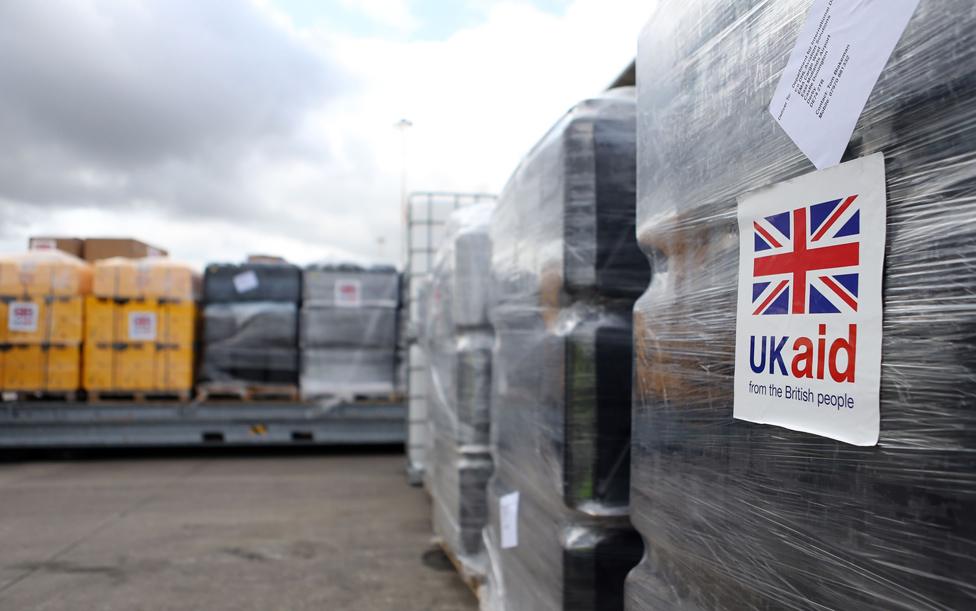Where does the UK's aid currently go?
- Published

Money from the UK's international aid budget is to be used to help councils house refugees from Syria. But where does the money go to now?
Prime Minister David Cameron has promised that the UK will accept up to 20,000 more Syrian refugees by 2020.
To help fund this, Chancellor George Osborne says that money should be used from the foreign aid budget to provide support for local councils. He said there should be a "fundamental rethink" of how the aid budget is used.
The UK has committed to spending 0.7% of its GDP, about £12bn, on foreign aid. It is said to be the first nation in the G7 to meet a target set by the UN 45 years ago, external.
Most of the money is spent by the Department for International Development (DfID). Three of its priorities, external for the year include helping to halve malaria deaths in 10 of the worst affected countries, immunise more than 55 million children against preventable diseases and encourage nine million children into primary school.
Last year, nearly 60% of the foreign aid budget went to developing countries, external as bilateral aid. About 40% went to big international organisations such as the UN and The Global Fund to Fight Aids, Tuberculosis and Malaria.
The countries that received the most bilateral aid, external - money that goes from the UK to a single nation - in 2013 were Pakistan (£338m), Ethiopia (£329m) and Bangladesh (£272m), according to the last full spending report.
DfID says money spent in Pakistan, external will not only help those in poverty but "will also improve stability and security in the region, and beyond".
The government says, external that "good progress" has been made in Bangladesh, with maternal deaths falling and more girls getting into school. But high levels of infant mortality remain a big challenge. A top priority there is a "strengthened investment climate". Supporting the private sector is also a key focus in Ethiopia, external.
Decisions about aid are not always made for purely altruistic reasons, explains Emma Mawdsley from the University of Cambridge and expert in international development. "Aid is used for a huge variety of different purposes - from refugees, to longer term development to investment funds through the Commonwealth Development Corporation," she says.
Some critics argue that altruism is "the least persuasive" reason for giving foreign aid, she adds. The budget can also be used as a tool to promote the UK's "soft power" and to further its commercial interests.
Last year, Pakistan was the second to top country of origin, external for asylum seekers to the UK. Migrants from Pakistan, Ethiopia and Bangladesh have all been coming to Europe.
Budget decisions are often controversial. India used to receive the most bilateral aid but it dropped to fourth in 2013, external as critics argued that it was wealthy enough to pay for its own development. DfID says its partnership with India is still "in transition" but its existing projects will finish this year, external.
Nigeria was also in the top five receivers of bilateral aid, external for 2013. There are significant groups of migrants from Nigeria trying to reach Europe and the government says that a more stable and prosperous situation, external would "help reduce crime and illegal migration".
But out of the estimated 350,000 people that were detected at the borders of Europe in January to August 2015, the largest group of people by nationality were Syrians. This was followed by Afghans and Eritreans.
How does the UK decide where to spend its overseas aid budget?
The UK says that it has already spent £1bn, external to help people fleeing the civil war in Syria since 2012.
Much of this has been spent on helping some of the four million refugees who escaped to neighbouring countries such as Jordan. DiFD says that money has been given to "partners" including the UN and the Red Cross. Some are helping in refugee camps and the budget has helped provide supplies such as food and clean water. The UK says it has helped fund , externalmore than 13 million food rations and more than three million relief packages in Syria since 2012.
"The UK is already doing a lot," says Kathleen Spencer Chapman, head of policy at Oxfam. "Including in those countries that we are seeing refugees coming from or in countries where those refugees are ending up such as Jordan and Lebanon."
The decision to use some of the foreign aid budget to help Syrian refugees in the UK could prove controversial. "Our starting point is that aid should be used to reduce poverty in developing countries," says Spencer Chapman.
Others argue that the measure is not that unusual. Some funding is already used to help asylum seekers in their first year, explains Mawdsley. But it's a decision that "can really alienate and it can really find support".
Subscribe to the BBC News Magazine's email newsletter, external to get articles sent to your inbox.